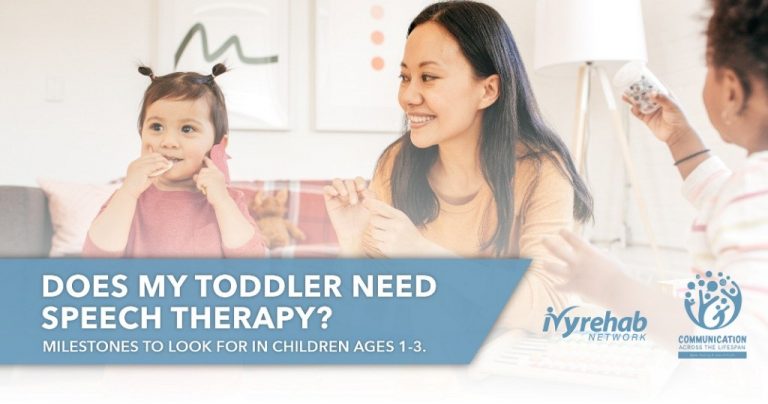
Does My Child Need Speech Therapy?
This content was updated for accuracy and relevance on August 23, 2023
Parenting doesn’t come with an instruction manual, and many parents have questions about what is normal when it comes to developmental milestones. Are you worried your child is behind when it comes to crawling, walking, or talking? Have you noticed your toddler seems to struggle with making eye contact, playing with toys, or asking for things? Children go through many stages of development from birth to 3 years old. In terms of speech and language, development usually follows a pattern in which certain milestones, or language skills, emerge by a certain age. While there are typical expectations of what is normal, some children develop quicker or slower than others. So, does my toddler need speech therapy? Here are some of the speech and language skills a typically developing child should reach by specific ages.
Speech Milestones for Children
As a parent, it can be hard to know the signs of a possible delay in your child’s speech development. Additionally, there is a number of speech disorders that could begin affecting children at a young age which may include stuttering, articulation disorder, childhood apraxia, and Fragile X Syndrome. How do you know your child’s speech development is on track or not? What speech difficulty is considered usual or unusual? Let’s find out.
Language Development at 1-year-old
Expressive Language:
- Babbles, using a variety of different syllables (ex. “badugatadudah”)
- Begins to use approximations of first words (ex. “wawa” for water)
- Uses non-verbal communication to make requests (ex. pointing, waving)
- Overall speech is mostly incomprehensible “gibberish”
Understanding:
- Responds to simple phrases such as “no,” “come here” or “want more?”
- Recognizes your voice, other sounds, and points or looks toward an object
- Relates words to actual objects (ex. understands the word “ball” means the object ball)
- Listens when spoken to
- Enjoys games like peek-a-boo and pat-a-cake
Red Flags:
- Does not point to objects
- Does not use gestures (ex. waving)
Language Development at 2 years old
Expressive Language:
- Says 10-15 words by 18 months; 40-50 words at 24 months
- Puts two words together (“more juice” or “car go”) and asks one- or two-word questions (“Where doggy?” and “Go bye-bye?”)
- Uses many different consonant sounds at the beginning of words
- Overall speech is about 50% understandable
Understanding:
- Points to pictures in a book when an object is named (“Where is the dog?”)
- Responds to simple questions (“Where’s your shoe?”)
- Follows a few simple commands, requiring gestures at times
- Listens to simple stories, songs, and rhymes
Red Flags:
- Has a vocabulary of fewer than 30 words
- Doesn’t show much interest in social interactions
Language Development at 3 years old
Expressive Language:
- Uses two- or three-word phrases to talk or ask about things, and will often name objects to direct attention
- A vocabulary of 300-400 words; has a word for almost everything
- Overall speech is about 75% understandable
Understanding:
- Follows two-step directions (“Get the ball and put it on the table”)
- Comprehension is rapidly increasing
- Understands differences in meaning (go/stop, big/little, up/down)
These are some general guidelines parents should look for to decide if further evaluation may be warranted. Just because your child has not accomplished one skill by the specified age, it does not automatically mean the child has a speech or language problem.
Early Intervention with Speech Therapy
There are many causes of speech and language delays. The good news is the sooner the child’s speech developmental delay or language problem is discovered and diagnosed, the sooner speech therapy can start. Children enrolled in speech language therapy before they are 5 years old typically have better outcomes.
You should discuss any concerns with your child’s pediatrician or an Ivy Rehab licensed speech language pathologist. They can determine whether a screening or formal speech and language evaluation are in order, and develop a plan of care to get your child’s speech and language up to speed. Ivy’s pediatric speech-language therapy can help with feeding, communication, articulation, voice, fluency, and cognitive function.
Article by: Holly Lookabaugh
Deur, PT, DSc, GCS, CEEAA
Holly Lookabaugh is a practicing physical therapist, partner and Director of Clinical Services at Ivy Rehab Network with more than 40 years of experience in sports management with young athletes, and is board certified as a geriatric clinical specialist and certified exercise expert for aging adults. Deuer is certified as an aquatic and oncology rehabilitation specialist and serves as adjunct faculty at Central Michigan University and Grand Valley State University.
The medical information contained herein is provided as an information resource only, and does not substitute professional medical advice or consultation with healthcare professionals. This information is not intended to be patient education, does not create any patient-provider relationship, and should not be used as a substitute for professional diagnosis, treatment or medical advice. Please consult with your healthcare provider before making any healthcare decisions or for guidance about a specific medical condition. If you think you have a medical emergency, call your doctor or 911 immediately. IvyRehab Network, Inc. disclaims any and all responsibility, and shall have no liability, for any damages, loss, injury or liability whatsoever suffered as a result of your reliance on the information contained herein.